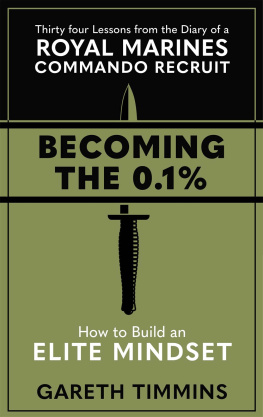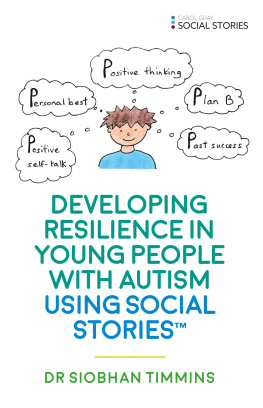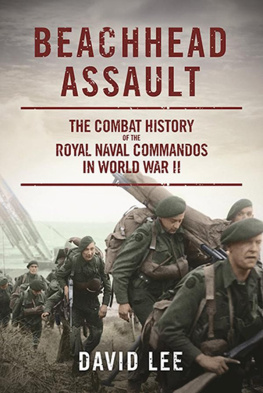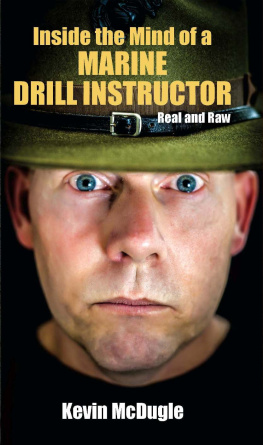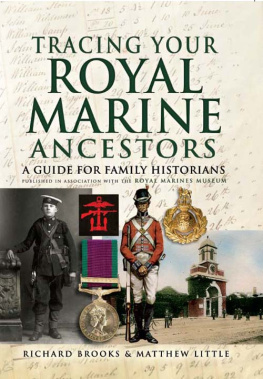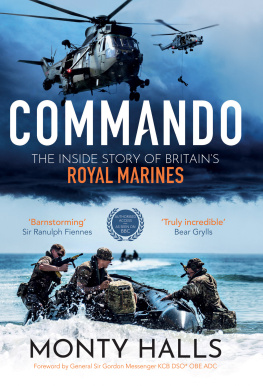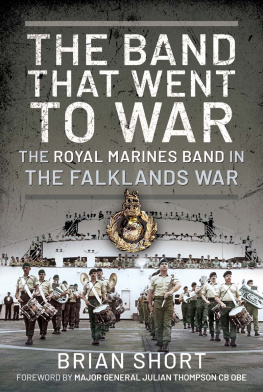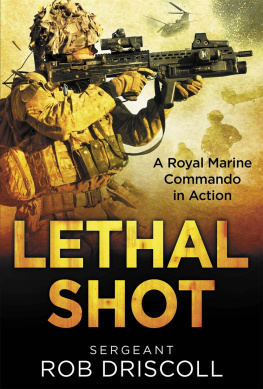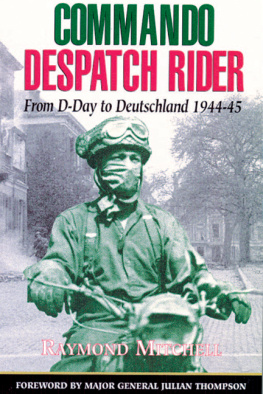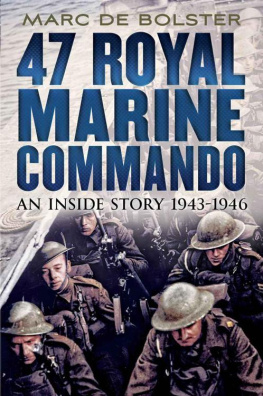ACKNOWLEDGEMENTS
To my son, Jax. Thank you for being my driving force during the past six years and holding me to account. I love you dearly and I hope this book both inspires you as you grow and makes you eternally proud of your dad, as I am of you.
To my mum, without you giving me the diary, this book would not have been possible a snapshot in history unrecorded. What I thought initially was a truly bizarre gift turned into my proudest and most fulfilling achievement to date; thank you Mum I love you lots.
To my dad, thank you for all your support, guidance and investment during my rugby years. Your mentorship and that exposure to those high-level environments nurtured and reinforced my mindset in preparation for the challenges I encountered in the Royal Marines.
To my beloved Grandma, I have the fondest memories of a wonderful loving, safe and secure childhood, and that is due to both you and Grandad. Thank you for always seeing the best in me and loving me unconditionally. I have no doubt that you are significantly responsible for the person who has written this full account of the past thirty-six years.
To my Grandad, my hero. You were in my thoughts every step of the way throughout training and ever since. I wish you could have stayed around a little longer to witness me going on to do what you had proposed I should.
To my family, I may not always show it, but I am deeply enriched by your care and attention. I would not be the person I have become without your support over the years, your patience, and enduring belief in my capabilities. Thank you for being you.
To my dear and best friend, Chris Snowden. The best of friends brothers for almost thirty years thank you for always believing in me, mate, and for supporting my every venture with my best intentions at heart. You fulfil everything (unreservedly) that one could wish for in a friend. Thank you.
To Ann Hopton, my academic mentor, the most special person I have ever met. A person who gives unconditionally without the expectation of anything in return. Your mentorship, advice, patience and concern undoubtedly guided me through my studies and helped me unpick the diary into thirty-four lessons that I cannot believe I have written. Thank you, Ann you have no idea how much I appreciate everything you have done for me during the past eight years.
To my literary agent, Nick Walters. I cannot thank you enough for reviewing my work and taking it on. This book is solely down to your foresight and vision; the idea of adding the thirty-four lessons was your brainchild. It not only made immediate sense, but it transformed the book comprehensively into something that I will be forever proud of having done. Nick, you are an incredible talent and have emerged as a fantastic friend.
To my editor, Cameron Myers, and the publishing team at Hodder & Stoughton. Thank you for believing in the concept and seeing the value in my work. I could not have wished for a better publishing house, editor, and team to take on my lifes work. Thank you dearly for all you have done and continue to do for my book.
To my copyeditor, Barry Johnston, thank you for treating my manuscript with such care and attention to detail. Your input on the finished product has been truly remarkable and greatly appreciated.
To Ben Williams. Royal, you unlocked the door to an industry that is inherently fickle for an emerging new author trying to make progress and bring a book to publication. The selflessness and humility that you offered by connecting me to Nick embody the values that run deep in the Royal Marines, and make the bond so special. I wish you every success with your book Commando Mindset and all that comes after. An enduring friendship forged.
To Gareth Vause, the guy that lurks in the shadows, yet whose impact is everything. Thank you, Gareth, for your unique quality of care and attention to my work and businesses. You are an incredible talent, a graphic designer and friend with an unbelievable eye for detail. I appreciate everything you do and look forward to what the future holds.
To Ed Stirzaker, I am so eternally grateful that our paths crossed whilst soul-searching together in 2005. Although we eventually took separate paths, I knew then I had stumbled across someone incredibly special. Thank you for your unconditional support and for the care, interest and input you put into this project.
To Dr Caroline Henderson the absolute best tutor a final year student could wish for. Thank you for being an integral part of this journey. Your support in my final year of university was incredible. More importantly, your expert and honest review of my lessons has not only added crucial value to this book, but has given me the confidence to explore further education.
Finally, to all the original members of 900TP and our Training Team of 2005/06. Thank you for giving me my greatest and most fulfilling memories. Much love and respect!
About the Author
Gareth Timmins is a former Royal Marines Commando who has spent time in Iraq, Somalia, Egypt and Afghanistan. Since leaving Afghanistan, he has worked for several ultra-high net-worth individuals in London, whilst providing a physical security and business development consultancy to blue-chip companies in the City of London.
Gareth completed his studies in Psychology after six years gaining a Diploma of Higher Education in Psychology and a BSc (Hons) in Forensic Psychology.
In more recent years, he founded Nought Point One (Projects) a quintessentially British fitness and adventure brand specialising in distinctive outerwear and essential tools, and inspired by the Royal Marines high standard of excellence and performance.
SELECT BIBLIOGRAPHY
Bringslimark, T., Hartig, T., & Grindal Patil, G., (2007). Psychological benefits of Indoor Plants in Workspaces: Putting Experimental Results into Context in HortScience , Vol. 42: Issue 3, pp. 51887. Available at: https://doi.org/10.21273/HORTSCI.42.3.581 (accessed 18 May 2019).
Ericsson, K.A., Krampe, R.T., & Tesch-Rmer, C. (1993). The role of deliberate practice in the acquisition of expert performance, Psychological Review , 3, pp. 363406. Exercise 11, pp. 21222.
Ericsson, K.A., & Harwell, K. (2019). Deliberate practice and proposed limits on the effects of practice on the acquisition of expert performance: Why the original definition matters and recommendations for future research, Frontiers in Psychology , 10, 2396.
Gladwell, M. (2008). Outliers. The Story of Success , Little, Brown and Company, New York.
Hardy, D. (2012). The Compound Effect , CDS Books, New York.
Kaplan, R., & Kaplan, S. (1989). The Experience of Nature: A Psychological Perspective , Cambridge University Press, New York.
Kaplan, S. (1995). The restorative benefits of nature: Toward an integrative framework, Journal of Environmental Psychology , 15:16982. DOI: 10.1016/0272-4944(95)90001-2.
Kubler-Ross, E. (1969). On Death and Dying , Macmillan Publishing Company, New York.
Tajfel, H., & Turner, J. (2001). An integrative theory of intergroup conflict in M.A. Hogg & D. Abrams (eds.), Key Readings in Social Psychology. Intergroup Relations: Essential Readings , Psychology Press, pp. 94109.
Maslow, A.H. (1970). Motivation and Personality (2nd ed.), Harper and Row, New York.
McClure, B.A. (1987). Metaphoric illumination in groups, Small Group Behavior , 18(2): pp. 17987.
Ulrich, R.S. (1983). Aesthetic and Affective Response to Natural Environment in Chambers University of Technology. Available at: DOI: 10.1007/978-1-4613-3539-9_4 (accessed 10 September 2020).
Wilson, Edward O. (1984). Biophilia, Harvard University Press, Cambridge, MA.
Zhang, Z., & Zyphur, M.J. (2015). Physiological functioning and employee health in organizations in: Colarelli, S.M., & Arvey, R.D. (eds.), The biological foundations of organizational behaviour, University of Chicago Press, Chicago, pp. 13967. Available at http://press.uchicago.edu/ucp/books/book/chicago/B/bo18990975.html (accessed 18 May 2019).

